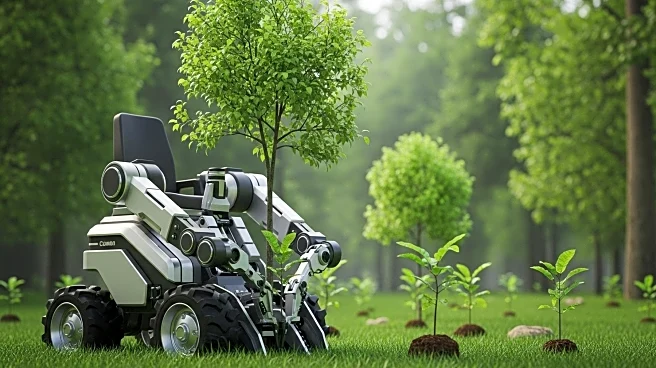What is the story about?
What's Happening?
By 2025, commercial tree planters are set to significantly increase global reforestation rates, integrating advanced technology such as robotics, AI, and satellite intelligence. These mechanized systems are designed for large-scale planting operations, capable of planting thousands of seedlings daily with precision. The technology includes GPS guidance, AI-driven automation, and soil sensing, which optimize planting success and reduce waste. This approach supports biodiversity, enhances carbon sequestration, and mitigates the adverse effects of deforestation. The use of commercial tree planters is becoming increasingly prevalent in regions like South America, Southeast Asia, and Africa, where they are employed in industrial timber plantations and bioenergy feedstocks.
Why It's Important?
The adoption of commercial tree planters is crucial for addressing climate change and promoting sustainable land use. By rapidly expanding forest cover, these planters act as carbon sinks, absorbing excess atmospheric CO2, which is vital for climate change mitigation. The technology also supports ecological restoration by efficiently reforesting degraded lands and supporting biodiversity through species diversification. Economically, commercial forestry management offers significant benefits, including job creation, skills development, and revenue generation from timber and ecosystem services. This approach attracts green investments and supports rural economies, making it a key component of sustainable development and climate adaptation strategies.
What's Next?
The future of commercial forestry management will likely see continued integration of advanced technologies, such as AI and robotics, to further optimize planting operations. Challenges such as site accessibility, seedling quality variability, and ecological risks associated with monocultures will need to be addressed. Ongoing research, inclusive stakeholder planning, and integrated green finance models are essential to overcoming these barriers. As technology evolves, commercial tree planters will play a pivotal role in global sustainability efforts, supporting both environmental and economic resilience.
Beyond the Headlines
The use of commercial tree planters raises important ethical and ecological considerations, particularly regarding the balance between economic productivity and ecological stability. The risk of monoculture plantations undermining biodiversity and increasing vulnerability to pests or disease must be managed through adaptive management and species diversity. Additionally, the reliance on technology must respect local ecological knowledge and involve continuous monitoring and adaptive planning to meet both economic and environmental objectives.















